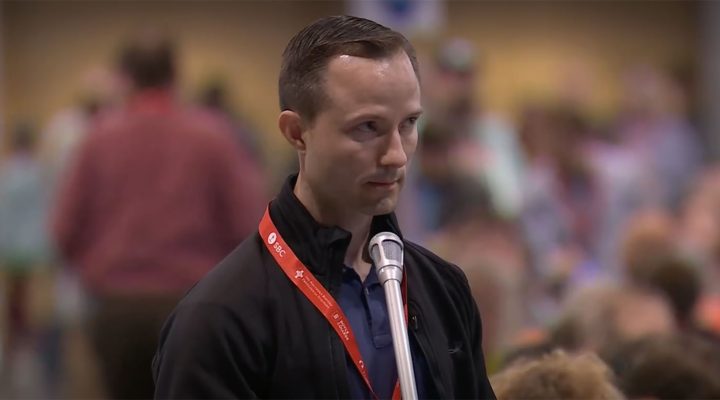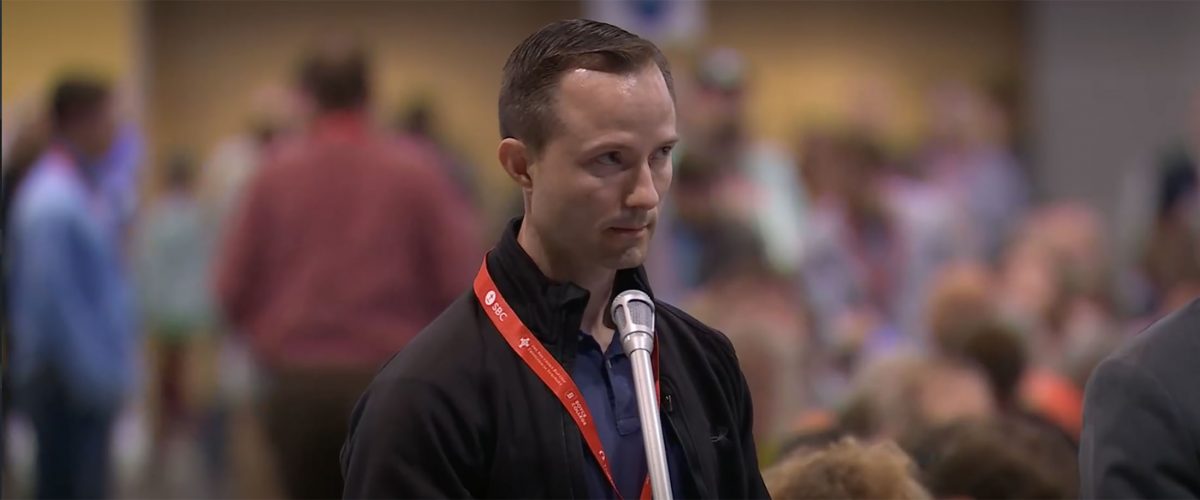That there are two distinct views on the meaning of religious liberty among Southern Baptists came into stark contrast June 11 during lengthy debate of a resolution “on defending religious liberty.”
The convention’s Resolutions Committee put forward the resolution that declared: “Our Christian witness is better preserved by the separation of church and state, and Scripture and history have shown that true revival comes through the Spirit of God by means of fervent prayer, gospel evangelism and biblical discipleship.”
Justin Ramey, pastor of Crider Baptist Church in Eddyville, Ky., was the first person to speak against the resolution. He said a New Testament passage cited in the resolution “does not offer a general statement of religious liberty, endorsing the freedom to have Satan worshippers, etc.
“He commands all to joyfully serve the Lord alone or burn in hell for all eternity.”
“The first resolve states that God has endowed every human with religious liberty. I disagree” he said. While government is not competent to evaluate and have jurisdiction over heart and soul, “my God is and does. He commands all to joyfully serve the Lord alone or burn in hell for all eternity.”
Ramey also opposed a line in the resolution that said, “We oppose any effort to use the people and the churches of the Southern Baptist Convention to establish Christianity as the state religion of the United States.”
“What does that mean?” he asked. “Should we remove ‘In God We Trust’ from our currency? Does it mean we should remove ‘under God’ from our Pledge? I’m grateful that our government at one time at least acknowledged Christianity as our foundation and encouraged it.”

John Knight
Next, messenger John Knight from Pleasant Ridge Baptist Church in Charlestown, Ind., asked to amend the resolution by deleting three full paragraphs. Those objectionable paragraphs state:
Resolved, that we oppose any effort to establish a state religion of any nation, including the United States of America; that we refute the idea that God has commanded any state to establish any religion or any denomination; and we reject any government coercion or enforcement of religious belief, including blasphemy laws; and be it further
Resolved, that we oppose any effort to use the people and the churches of the Southern Baptist Convention to establish Christianity as the state religion of the United States of America; and be it finally
Resolved, that we object to any suggestion that our historic, God-given distinctive of religious liberty should be abandoned in favor of a state-mandated religion.
The attempt to delete these paragraphs — which express historic Baptist convictions on religious freedom — eventually failed on a show-of-ballots vote but only after intensive efforts to sway messengers.
Knight declared, “There is no such thing as the separation of God and state.”

Jeff Wright
In response to another attempt to amend the resolution, Jeff Wright of Midway Baptist Church in Cookeville, Tenn., said he values “our health Baptist tradition” but said the chairman of the Resolutions Committee “just cited the U.S. Constitution, which is not equivalent to the Baptist tradition; those are not the same thing.
“The language we have is a free church in a free state, not a free temple or a free mosque or whatever else you would substitute for that,” he said. “And so we as a people have to walk a road between two ditches, denying the goodness of our Baptist tradition and also on the other side yielding ground to those who would substitute religious diversity in the place of actual religious freedom.”
Several other messengers, in addition to the chairman of the Resolutions Committee, affirmed the original language of the proposed resolution as more fully in keeping with Baptist history and tradition — believing in religious liberty for all people, not just for Christians.
The debate on this resolution mirrors the dividing line between those labeled as Christian nationalists — who believe God ordained America as a Christian nation — and those who seek religious liberty for all.
After about half an hour of debate, SBC messengers approved the entire resolution:
Whereas, the Lord Jesus Christ drew a clear distinction between his church and the governments of this world (Matthew 22:15-22) and reserved the judgment between believers and unbelievers for himself alone (Matthew 13:36-43); the Apostle Paul urged Timothy to pray for religious liberty (1 Timothy 2:1-5) and demonstrated that religious belief is subject to personal persuasion (Acts 17:22-31); and the Apostle John revealed “each one” will be judged “according to their works” (Revelation 20:12-13); and
Whereas, Baptists in America have consistently championed Constitutional protections against the establishment of state religion and for the free exercise of religion, believing the importance of religious liberty necessarily made it the “first freedom” to be articulated in the Bill of Rights; and
Whereas, messengers to the meetings of the Southern Baptist Convention, from its inception in 1845, have adopted numerous resolutions advocating religious liberty and recognized that true faith cannot be legislated, coerced, or inherited; and
Whereas, when adopting the Baptist Faith and Message in 1925, Southern Baptists saw a need to emphasize religious liberty by adding Article XVIII on “Religious Liberty” (subsequently Article XVII in the 1963 and 2000 editions), thereby affirming the lordship of Christ, the separation of church and state, that “a free church in a free state is the Christian ideal,” and that “the state has no right to impose penalties for religious opinions of any kind”; and
Whereas, through nature and conscience, others have come to recognize that our natural rights and responsibilities derive from our Creator, an open truth that the founders of the American nation also explicitly recognized; and
Whereas, Baptists have historically affirmed that nothing in the public square is truly neutral and have promoted active and holistic participation in society which should reflect biblical values as outlined in Article XV of the Baptist Faith and Message, “The Christian and the Social Order”; and
Whereas, our Christian witness is better preserved by the separation of church and state, and Scripture and history have shown that true revival comes through the Spirit of God by means of fervent prayer, gospel evangelism, and biblical discipleship; now, therefore, be it
Resolved, that the messengers to the Southern Baptist Convention meeting in Indianapolis, Indiana, June 11-12, 2024, boldly affirm that God has endowed every human with religious liberty, for “God alone is Lord of the conscience” (Article XVII); and that “Civil government being ordained of God, it is the duty of Christians to render loyal obedience thereto in all things not contrary to the revealed will of God” (Article XVII); and be it further
Resolved, that we encourage and support robust Christian engagement in the public square, including individual Christians who pursue elected or appointed office in order to influence government by living out their Christian worldview while advocating Christian morals with respect for the consciences of all people; and be it further
Resolved, that we reaffirm the 2023 resolution “On Christ’s Sole Lordship over Every Human Conscience” in its declaration that “we decry any effort which seeks to supplant the sole lordship of Christ over consciences through confusing the separate covenants and responsibilities of the church and the state”; and be it further
Resolved, that we oppose any effort to establish a state religion of any nation, including the United States of America; that we refute the idea that God has commanded any state to establish any religion or any denomination; and we reject any government coercion or enforcement of religious belief, including blasphemy laws; and be it further
Resolved, that we oppose any effort to use the people and the churches of the Southern Baptist Convention to establish Christianity as the state religion of the United States of America; and be it finally
Resolved, that we object to any suggestion that our historic, God-given distinctive of religious liberty should be abandoned in favor of state-mandated religion.


